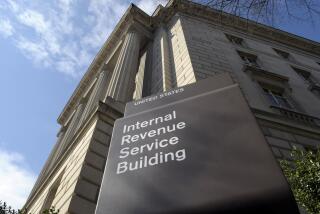Shortfall in Pension Funds Rises Sharply to $50 Billion, U.S. Says
- Share via
WASHINGTON — The shortfall in employee pension funds increased from $40 billion to more than $50 billion in the past year, a jump of more than 25%, the head of the federal agency that insures pension funds said Saturday.
James B. Lockhart III, executive director of the Pension Benefit Guaranty Corp., called the sharp rise a “serious problem” that indicates that the federal pension insurance system needs major reforms to protect retirees and taxpayers. He said the agency plans to announce the new figure this week after it completes other related calculations.
The federal pension insurance fund is made up of payments from companies with pension plans, but if the fund ran out of money, taxpayers would make up the difference, Lockhart said.
The PBGC insures employee pensions up to about $28,000 a year. More than 40 million employees have pensions covered by the federal pension insurance fund.
During President-elect Bill Clinton’s meeting in Washington last week with House Democrats, Rep. J. J. Pickle (D-Tex.) said Congress needed to act to prevent companies from making pension promises they cannot afford because the government insurance fund could end up paying for them.
In many cases, companies operating under bankruptcy court protection have increased pensions for employees rather than raising pay. The maneuver helps retain workers and does not cost the cash-strapped companies any immediate funds. And management and union leaders know the federal pension insurance fund will pick up the tab if the company doesn’t survive and can’t meet its pension obligations.
“If we don’t do something, the pension problem is going to be the next S&L; scandal,” Pickle said he told Clinton and House Democrats last week. Pickle said the President-elect nodded and said this was a major question that should be addressed.
Pickle, chairman of the oversight subcommittee of the House Ways and Means Committee, said he will hold hearings early next year to examine the growing risk to retirees and taxpayers of pension funding gaps.
More to Read
Inside the business of entertainment
The Wide Shot brings you news, analysis and insights on everything from streaming wars to production — and what it all means for the future.
You may occasionally receive promotional content from the Los Angeles Times.










